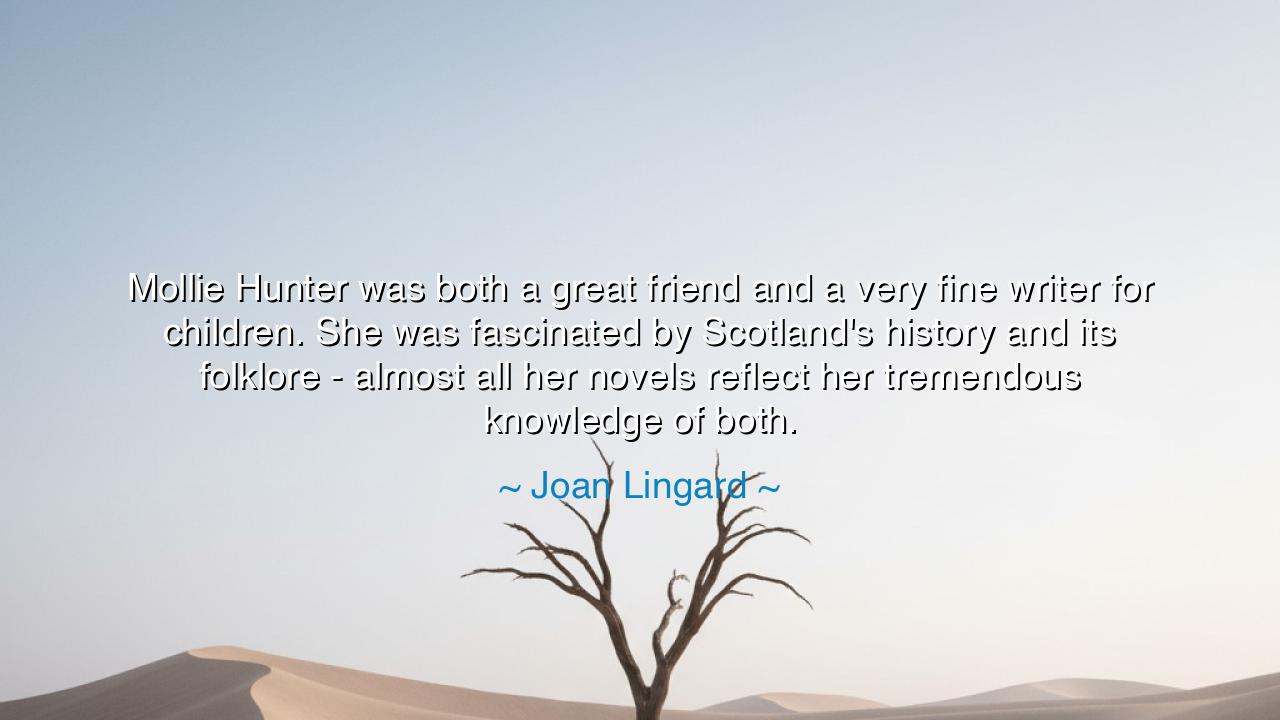
Mollie Hunter was both a great friend and a very fine writer for
Mollie Hunter was both a great friend and a very fine writer for children. She was fascinated by Scotland's history and its folklore - almost all her novels reflect her tremendous knowledge of both.






In the gentle cadence of remembrance, Joan Lingard once spoke these words of praise: “Mollie Hunter was both a great friend and a very fine writer for children. She was fascinated by Scotland's history and its folklore—almost all her novels reflect her tremendous knowledge of both.” To the untrained ear, this may sound like a simple tribute between two writers; but to the ear of the wise, it is a testament to the eternal bond between story and heritage, between art and memory, between those who dream and those who preserve the dreams of a people. In Lingard’s words, we hear the echo of an older truth—that those who remember their roots give life to the spirit of their land, and that those who write for children shape the soul of the generations to come.
To understand the meaning of Lingard’s reflection, we must first look to Mollie Hunter, a Scottish writer whose stories drew deeply from the well of her homeland. Born in East Lothian in 1922, Hunter grew up surrounded by the myths, legends, and rhythms of Scottish folklore—the whispered tales of selkies, spirits, warriors, and ancient kings. But unlike many who leave such tales behind in childhood, she carried them with her into her craft. Through novels like The Ghosts of Glencoe, The Stronghold, and A Stranger Came Ashore, she wove the mystical and the historical into stories that stirred both the imagination and the heart. For her, the past was not dead—it was alive, breathing through every mountain, loch, and mist-filled glen of her beloved Scotland.
When Lingard, herself a celebrated author, called Hunter a “fine writer for children,” she was acknowledging more than literary skill. She was honoring a rare calling—the ability to speak to the innocence and curiosity that dwell within young minds. The ancients understood this gift well, for the greatest teachers were also storytellers. They knew that truth, when wrapped in the garments of wonder, could pass unhindered into the hearts of the young. Mollie Hunter, in reviving the legends and history of Scotland, became not just a writer, but a keeper of cultural memory. Her books did not merely entertain; they taught children who they were and where they came from.
This devotion to one’s heritage calls to mind the bards of old, those wandering poets who preserved the identity of nations through song and tale. When kingdoms fell and empires faded, it was the storyteller who kept the light of memory burning. In ancient Greece, Homer sang of heroes and gods; in medieval Ireland, the seanchaí recited the sagas of their clans. Mollie Hunter, in her own time, continued this sacred lineage. Through her pen, she became the bard of modern Scotland—a bridge between the forgotten and the living, between myth and modernity. Lingard’s words, then, are not just remembrance; they are a hymn to the power of storytelling as preservation.
But there is something even deeper in Lingard’s tribute: friendship. “She was both a great friend and a very fine writer.” The ancients knew that friendship among creators is a sacred bond, a meeting of souls who see the world through kindred eyes. Such friendship is not mere companionship—it is mutual reverence for truth and craft. Joan Lingard and Mollie Hunter, each a storyteller in her own right, shared a devotion to place, to history, to the quiet dignity of human lives. In speaking of Hunter, Lingard speaks also of love—the love between artists who see in one another the flame of creation that must never be allowed to die.
And so, what lesson may we draw from these words? It is this: that every people must cherish their storytellers, for they are the guardians of the nation’s soul. In a time when stories fade beneath the noise of distraction, we must remember the importance of those who listen to the whispers of history and retell them for the young. Whether through writing, art, or simple conversation, each of us can become a custodian of the tales that shaped us. To forget them is to lose our compass; to honor them is to keep our spirit whole.
Therefore, let us walk in the way of Mollie Hunter—to seek wonder in the familiar, to weave wisdom into story, to speak of our ancestors not as shadows but as guides. And let us heed Joan Lingard’s example—to honor those who came before us, who turned the raw clay of history into the living breath of art. For in remembering their craft, we remember ourselves. And as long as there are those who tell the stories of their land with love and truth, no nation—no people—can ever be forgotten.






AAdministratorAdministrator
Welcome, honored guests. Please leave a comment, we will respond soon